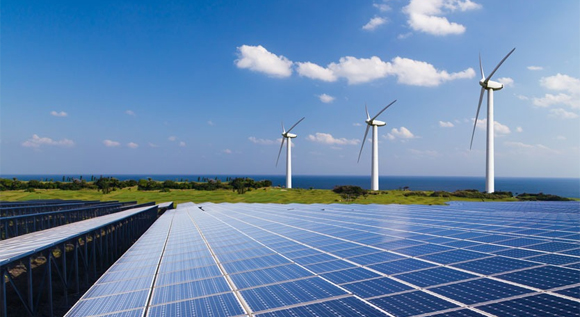Renewables first
The first acceleration measures of the revised Renewable Energy Sources Act (EEG) now apply: Renewable energy will take greater priority in all decisions in the future. There is more funding available for photovoltaic installations on rooftops.
 © iStock.com/imacoconut
© iStock.com/imacoconut
Renewable energy first! The first provisions of the revised Renewable Energy Sources Act entered into force on 29 July. They will help to enormously speed up the roll-out of renewables. By 2030, at least 80% of electricity consumed in Germany could come from renewable sources. For this to happen, the share of renewables has to double within less than a decade – a challenge that is even greater than it sounds: electricity consumption is set to rise at the same time, for example, through the increasing electrification of industrial processes, heat and transport.
Prioritisation of renewables and more money for rooftop PV installations
As of 29 July, the central principle applies that renewables are in the „overriding public interest” and serve public security. They must thus be given preference where the law allows for trade-offs between various legal interests (for instance, in the preservation of historic buildings and nature conservation). More money is already available for new photovoltaic installations on rooftops: the remuneration for solar power for owners of such installations can now amount to up to 13.4 cents per kilowatt-hour (kWh). At the same time, connecting to the grid will be made simpler, not least for small-scale photovoltaic installations.
Federal Minister Robert Habeck explained why, „In view of the worsening climate crisis and Russia’s war of aggression on Ukraine, the expansion of renewable energy has become a matter of national and European security. This is why we have been doing all we can to substantially improve the policy environment for renewable energy.”
Germany at last on track to meet the 1.5-degree target
Its guidelines for the expansion of renewables mean the 2023 Renewable Energy Sources Act is, for the first time, consistently geared towards achieving the 1.5-degree goal set out in the Paris Agreement.
Agrivoltaic installations and other special solar installations will fall under regular funding. In the future, this will enable agrivoltaic installations to, in principle, be funded on all arable land via the RES Act. It will facilitate the use of the same land for both agricultural and energy purposes, (as previously reported).
With the revision of the Renewable Energy Sources Act, the development of less windy sites, especially in the south of Germany, will become much more attractive. Likewise, the concept of citizens’ energy is to be expanded on and strengthened, as are opportunities for financial participation by municipalities. Furthermore, the RES Act surcharge was reduced to zero on 1 July 2022. The 2023 revision entirely abolishes it.
The new RES Act will be complemented by further laws for quick expansion, such as the Onshore Wind Energy Act, which obliges the federal states from the north to the south of Germany to reach clear area targets, and the Offshore Wind Energy Act, which significantly increases the expansion targets for offshore wind energy.

